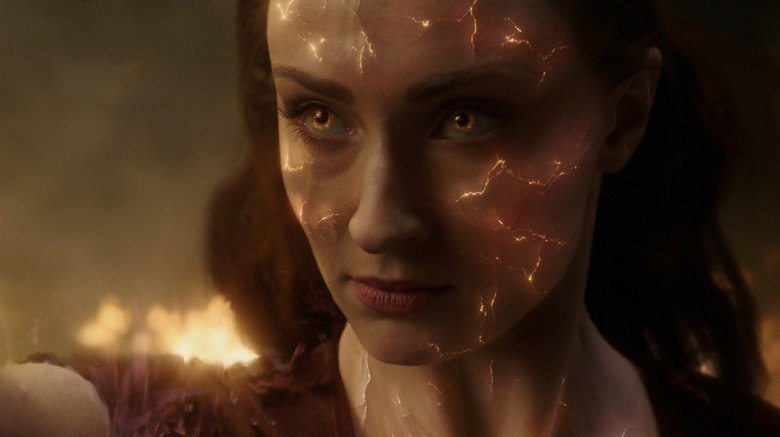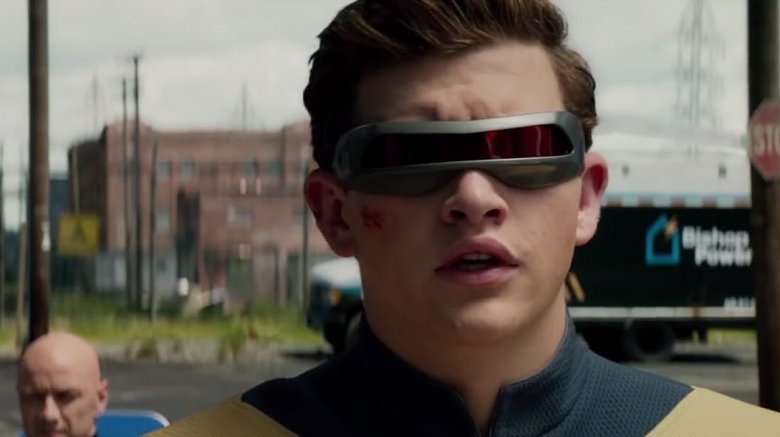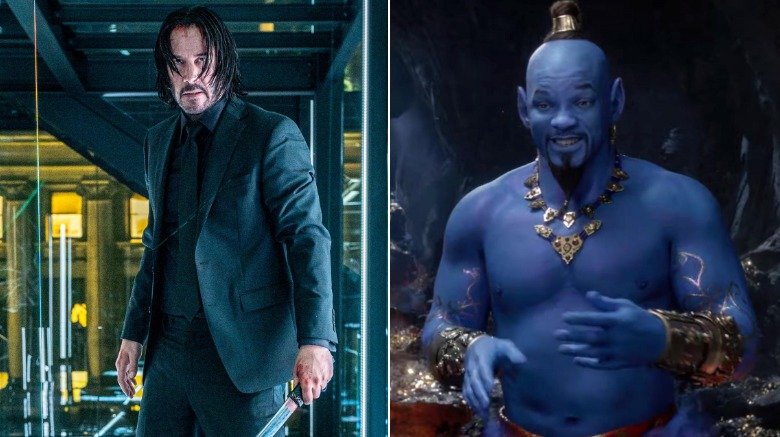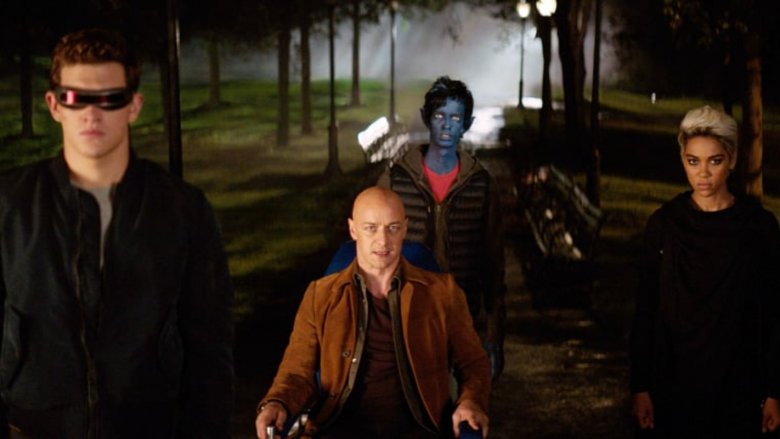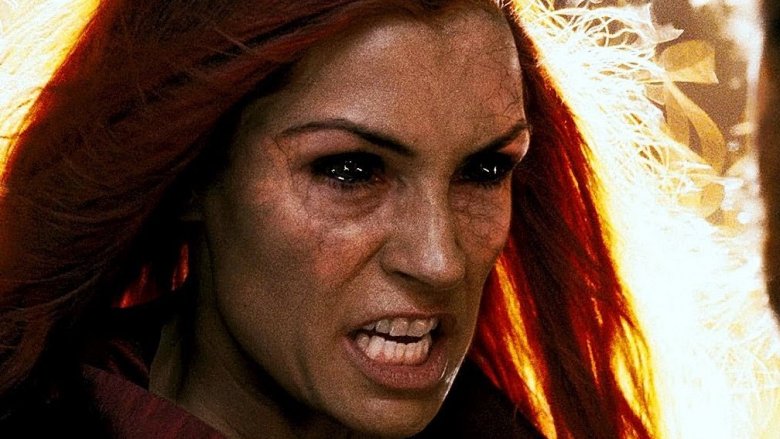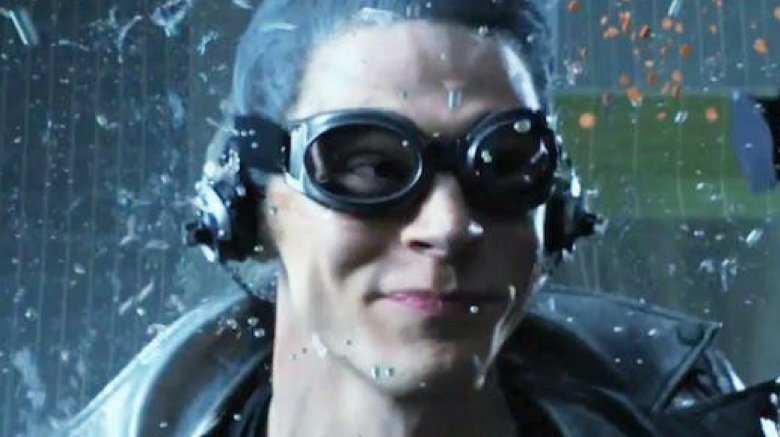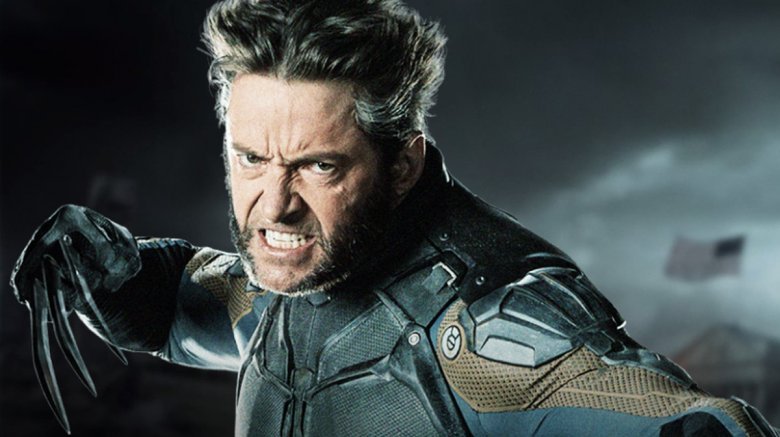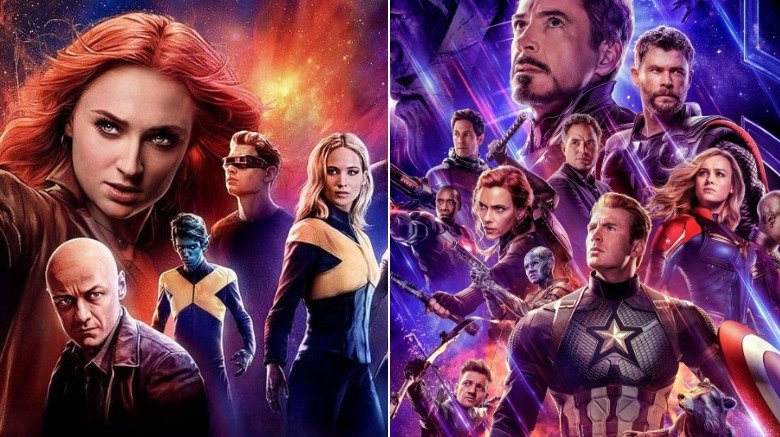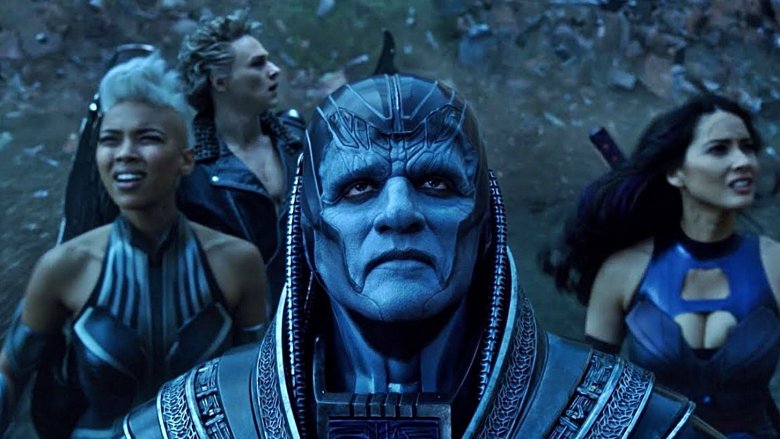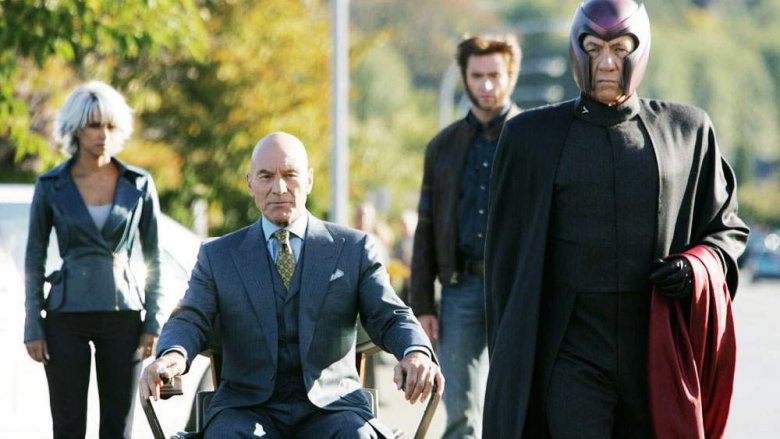Why Dark Phoenix Bombed At The Box Office
Jean Grey (Sophie Turner) may threaten to set the world on fire in X-Men: Dark Phoenix, but the movie itself didn't come close to doing the same.
Shortly before its release, Dark Phoenix was already projected for soft opening weekend ticket sales of $50 million — lower than any opening weekend gross of the entire X-Men film franchise. Instead, the last entry of Fox's X-Men narrative fell well below those early disappointing predictions and instead pulled in $33 million domestically.
Why did Dark Phoenix fail so abysmally? Was it purely a question of quality — was it just bad? Does the shadow of Disney's acquisition of Fox loom too large for any of Fox's Marvel properties to get a fair shake at the box office? Has the competition of 2019's blockbuster's season proven too formidable for Charles Xavier's gifted youngsters, or are the failures of past X-Men entries too fresh in audiences' minds for them to give the mutant heroes the benefit of the doubt?
Take a step back and it becomes clear that when it comes to Dark Phoenix's failure, so many factors combined to push the film below the surface that it doesn't seem possible it ever had a chance. Here's why X-Men: Dark Phoenix bombed at the box office.
Negative reviews
Well before its June release, it seemed likely the critical response to Dark Phoenix would be brutal. In late January 2019 we learned that the third of Dark Phoenix's test screenings bombed terrifically. In spite of extensive reshoots, including a change to the climax because of perceived similarities to another Marvel movie, once critics got a look at the finished product their responses were as merciless as you'd imagine. As of this writing, Dark Phoenix's Rotten Tomatoes score is a pathetic 23%, making the film's release comparable to the premieres of 2015's Fantastic Four, 2004's Catwoman, and the Titanic (not the movie — the actual ship).
When you get a movie this poorly reviewed, it often seems like the critics are competing for the best takedown, and the collective heckling of Dark Phoenix is no exception. Brian Tallerico minces no words at RogerEbert.com when he calls the film "a joyless, lifeless, boring affair." Matthew Rozsa argues at Salon that Dark Phoenix is "so disappointing" that 2017's Logan must be considered the X-Men film franchise's "proper finale." But while bashing Dark Phoenix may not technically be a contest, if we decide we want to treat it like one, then the possible champ is Adam Graham of the Detroit News, who feels the battle between the X-Men and the D'Bari on the prison transport train is the "perfect metaphor" for the X-Men series because the fight "takes place aboard a moving train that feels like it's headed nowhere."
Stiff competition
Whether or not X-Men: Dark Phoenix deserves the thrashing the critics gave it, the final X-Men entry faced enough serious competition at the box office that its poor performance may have been inevitable even if it had proven a critical darling.
First in Dark Phoenix's list of competitors was the live-action remake of Aladdin, which premiered two weeks earlier and was still going strong in theaters. Like Dark Phoenix, while Aladdin scored better on Rotten Tomatoes, it sill didn't impress many critics. Regardless, the comedy musical put butts in seats to the tune of a $91.5 million opening weekend. The Marvel mutants also had to contend with John Wick: Chapter 3, which managed to woo critics and audiences.
Of course we'd be remiss if we didn't mention that while it was released a month and a half before Dark Phoenix, Marvel Studios' insanely successful Avengers: Endgame was still doing well in theaters when the newest X-Men film came out. Considering the poor reviews of the X-Men finale, it would be more than understandable if moviegoers found the notion of getting a second or third viewing of Endgame under their belt preferable to sitting through Dark Phoenix.
Lame duck heroes
You could argue that the failure of Dark Phoenix didn't happen in June 2019 when it was released in theaters, but rather that its failure was certain long before its release — before, even, the release of its predecessor X-Men: Apocalypse — when the world learned in December 2017 that Disney was going to acquire 21st Century Fox.
While the deal wasn't finalized until over a year after that initial announcement, once fans knew Marvel's mutants would be in the same narrative as the Avengers, discussion about the remaining Fox X-Men movies couldn't compare to the speculation revolving around how and when the X-Men would be integrated into what's become known as the Marvel Cinematic Universe. Fans even speculated that the X-Men would play a role as early as Avengers: Endgame. Even now that the Avengers' final battle against Thanos has come and gone with no sign of Wolverine, fans theorize the events of infinity War and Endgame will prove to be the key to how the mutants show up in the MCU.
In other words, once fans learned the X-Men would eventually be in the MCU, the Fox X-Men films hardly seemed to matter. Like a lame duck president — the term often used for a comparatively powerless president waiting to be replaced by the president-elect – the X-Men of Apocalypse and Dark Phoenix became lame duck superheroes once we all knew the franchise was coming home.
Haven't we done this before?
X-Men: Dark Phoenix loosely adapts the classic Marvel storyline The Dark Phoenix Saga. That story was also adapted in 2006's X-Men: The Last Stand. Why would the same film franchise adapt the same story twice? Yes, there was a soft reboot in X-Men: Days of Future Past that made it so nothing in The Last Stand ever happened. But, you know... we didn't lose our memories. We weren't part of the reboot.
Uncanny X-Men #1 came out in 1963. That's over half a century's worth of comic book stories to choose from, and it seems bizarre to go back to one that's already been adapted. Yes, The Last Stand is one of the most poorly received X-Men entries, but it still seems insanely wasteful for the filmmakers to ignore so much narrative history in favor of going back to where they've already been.
Speaking of X-Men: The Last Stand being one of the most hated X-Men films — that means when audiences who were unfortunate enough to see that earlier film see Dark Phoenix, it not only feels repetitious, the deja vu isn't even from a good movie. You're reminding them of one of your worst, and it's a mystery why anyone would want to do that.
Needed more Quicksilver
One of the most disappointing aspects of X-Men: Dark Phoenix is the relative absence of Quicksilver (Evan Peters). The Fox version of the character debuted in X-Men: Days of Future Past and was key to the film's centerpiece — an impressive time-shifting sequence when Quicksilver uses his super speed to save his comrades from Magneto's (Michael Fassbender) Pentagon prison guards to the tune of Jim Croce's classic "Time in a Bottle." There was something of a sequel to this scene in X-Men: Apocalypse. Since the film is set in the '80s, it's to Eurythmics' "Sweet Dreams (Are Made of This)" that the mutant rescues most of the inhabitants of Xavier's School for Gifted Youngsters when an explosion rips through the mansion.
Dark Phoenix, set in the '90s, unfortunately is absent of any similar time-slowing Quicksilver scene set to TLC's "No Scrubs" or Nirvana's "Come As You Are." In fact, Quicksilver is hardly in the film at all. He helps save the astronauts in the beginning of the film and later, during the team's first battle with Jean Grey, the speedster is injured and sits out for most of the rest of the movie.
Not only would another of the character's popular time-shifting sequences have been a welcome addition to Dark Phoenix, but he tends to provide comic relief — something desperately lacking in this dark and melodramatic finale to the X-Men series.
Needed more Logan
No, there was no chance Hugh Jackman would reprise his role as Wolverine in X-Men: Dark Phoenix. The actor retired the role after 2017's Logan, and has since said the only way he would play the character again is in the event of an Avengers/X-Men crossover.
This makes Dark Phoenix the first X-Men entry to not include Hugh Jackman's Wolverine at least a little. Jackman makes a cussing cameo in 2011's X-Men: First Class and we get to see his escape from the infamous Weapon X program in X-Men: Apocalypse. He was a major player in every other X-Men flick, and led three solo movies. He was even in a post-credits scene of Deadpool 2, and was mentioned enough in Deadpool he may as well have been in the movie.
Making the Fox X-Men series final entry the first without Jackman was arguably a huge mistake. For better or worse, the first few X-Men films mostly revolve around Logan. Having an X-Men without him at all — without even mentioning him — is kind of like having a new Guardians of the Galaxy movie without Star-Lord (Chris Pratt). Sure, we enjoy the other characters, but the one who holds it all together was absent.
The X-Men pale in comparison
It would be dishonest, or at least forgetful, to not give credit to the early X-Men films for laying the foundation for the success of the MCU. While Marvel Studios' first film — Iron Man – was eight years away when X-Men was released in 2000, Bryan Singer's film proved to audiences that a Marvel superhero movie could be an amazing success. Sure, there were successful superhero movies before X-Men, but the failure of 1997's Batman and Robin put that franchise in a coma. Superman hadn't been in a live-action film since 1987's bomb Superman IV: The Quest for Peace, and while 1998's Blade made money, its hero was of a more violent strain who didn't come off as a comic book superhero in spite of his Marvel Comics origins.
Regardless, Marvel Studios' films have proven far superior to Fox's X-Men entries. While some MCU flicks are certainly not as well regarded as the rest, after a decade of movies with over 20 entries, nothing that's come out of Marvel Studios has been as horrendous as X-Men: The Last Stand or X-Men Origins: Wolverine. On the other hand, with the exception of Logan, nothing that's come from Xavier's school could compare to Marvel Studios' best. Not only does Disney's acquisition of Fox turn its X-Men into lame duck heroes, it means we're likely to see X-Men films better than any we've seen before.
Apocalypse was garbage
The X-Men franchise has had its share of ups and downs over the years — with critics as well as fans. The series hit an early low point with 2006's X-Men: The Last Stand, which made an early (and largely unsuccessful) attempt to adapt the Dark Phoenix comics saga for the screen. Things got back on track with 2011's First Class, which rebooted the entire franchise and took its story back to the beginning; its sequel, 2014's Days of Future Past, wiped out the events of The Last Stand entirely with an ambitious time-travel storyline that overhauled the saga's overall timeline.
After back-to-back triumphs, the series was due for a disappointment — and it arrived in a big way with 2016's X-Men: Apocalypse. The first X-Men entry after the soft reboot effected at the end of Days of Future Past, Apocalypse failed to break even domestically — only turning a profit with overseas ticket sales. While its critical reception wasn't quite as bad as Dark Phoenix's, it was still really bad and a year later sits at 47%.
With such a poor reception from critics and audiences, combined with the news of Disney's acquisition of Fox, it's arguably a mystery that Dark Phoenix was made at all. Yes, Apocalypse made money, but when there are so many other superhero films for fans to choose from, it's maybe a little foolish to think they'll come back when you've already disappointed them so thoroughly.
World saving is a game for the young
With X-Men premiering in 2000 and X-Men: Dark Phoenix acting as the series finale, the X-Men franchise ends when it's almost 20 years old. It's arguably ending later than it should have.
The box office landscape has changed a lot since X-Men was released, and the franchise hasn't aged well. The Days of Future Past reboot allowed for a new, younger cast and the CGI is better than it was in 2000, but the X-Men movies were still operating under a paradigm that doesn't hack it anymore with superhero films. Fox tried to copy Marvel Studios' complex narrative to a limited degree, but never seemed to realize audiences would care about huge discrepancies between films — for example, how the CGI-rendered Colossus of the Deadpool films was nothing like the Colossus (Daniel Cudmore) of the X-Men films. Or that the other few X-Men to show up in Deadpool wouldn't even have cameos in the X-Men movies.
The stakes were never as high in X-Men and the action was never as dynamic as it has been in more recent superhero fare. Not only did Disney's acquisition of Fox render the X-Men lame duck superheroes, it's about time. It's long past due for Marvel's mutants to come home and realize their full potential.
